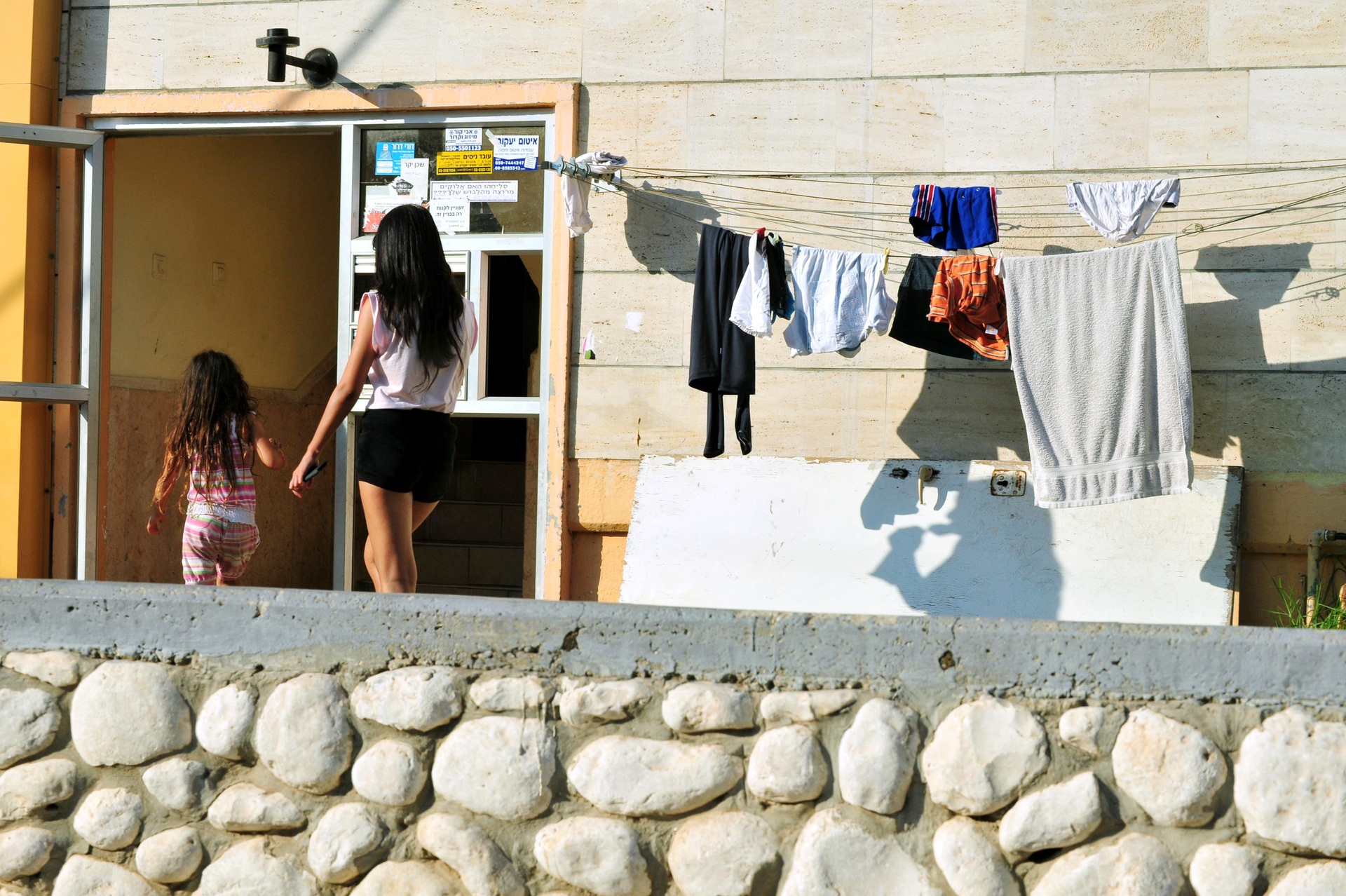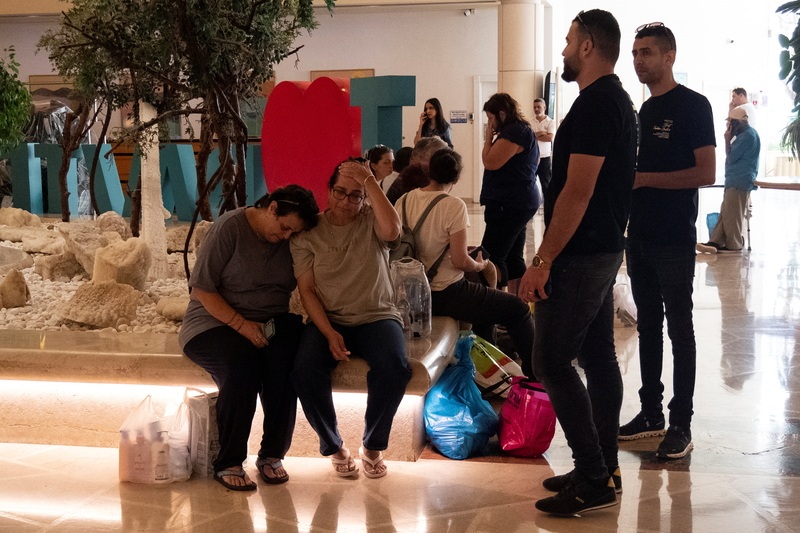Crisis in Israel’s Social Services: Overloaded, Understaffed, and Burning Out
There’s a crisis in Israel’s social services: every social worker is assigned more than 100 cases, there are thousands of unfilled positions and a new generation of employees is no longer willing to be punching bags – not for their clients and not for the system. Meanwhile, social work faculties are thriving, but most graduates don’t want to work in the traditional social services. Those who do, don’t last long. The Ministry of Welfare and Social Affairs, for its part, claims that it has been given 40 million shekels to deal with the problem. A special report


There’s a crisis in Israel’s social services: every social worker is assigned more than 100 cases, there are thousands of unfilled positions and a new generation of employees is no longer willing to be punching bags – not for their clients and not for the system. Meanwhile, social work faculties are thriving, but most graduates don’t want to work in the traditional social services. Those who do, don’t last long. The Ministry of Welfare and Social Affairs, for its part, claims that it has been given 40 million shekels to deal with the problem. A special report

There’s a crisis in Israel’s social services: every social worker is assigned more than 100 cases, there are thousands of unfilled positions and a new generation of employees is no longer willing to be punching bags – not for their clients and not for the system. Meanwhile, social work faculties are thriving, but most graduates don’t want to work in the traditional social services. Those who do, don’t last long. The Ministry of Welfare and Social Affairs, for its part, claims that it has been given 40 million shekels to deal with the problem. A special report
Photo illustration: Shutterstock

Shuki Sadeh
September 2, 2025
Summary


Listen to a Dynamic Summary of the Article
Created using NotebookLM AI tool
At the start of the Israel-Hamas war, immediately after the October 7 massacre, people evacuated from the affected areas were housed in hotels across the country. People and communities that had never relied on welfare from the state suddenly found themselves in need of support – and social workers played a critical role in providing it. “I saw it from up close,” says one former top official from the Ministry of Welfare and Social Affairs. “There was a sense among the social workers that what they were doing was important, that they were providing a solution at a time of real crisis. That is hugely satisfying. Gradually, however, things are going back to how they were beforehand.”
The evacuees, for the most part, have returned to their homes and their communities in northern and southern Israel and have started the long process of rehabilitation, the social workers themselves, the last fortress of support for the most precarious and vulnerable members of Israeli society, are once again dealing with the same problems that existed before the war – a profession in a constant state of underfunding – as well as the new cases that the war has created. “Just recently, I had 15 cases which were considered ‘dormant’ that suddenly became active again,” one veteran social worker from central Israel tells Shomrim. It’s not just dormant cases that have become active, however. Many social workers have opted to move to more attractive positions, either working for the Ministry of Defense or the private sector, where pay and conditions are significantly better than in the traditional welfare system. As a result, that traditional welfare system is in crisis.
“Ever since I started working 21 years ago, there has been a shortage in this profession,” the veteran social worker says. “I handle something like 100 cases and I only work three-quarters time. That’s an unfathomable number of cases. I work all day with the lists, juggling between the families. There are always unforeseen circumstances and unexpected balls that I have to keep in the air. We’re constantly putting out fires.”
Like teachers – who, as Shomrim reported last month in its Hebrew edition, ahead of the start of the new school year, are facing a massive shortage of manpower – the profession of social work is also severely understaffed. And the crisis is getting worse in precisely those places that need social workers most. According to figures released by the Ministry of Welfare and Social Affairs, just 25 percent of Israelis graduating from social work faculties even end up working in the ministry’s Social Services Department – formerly known as the Welfare Offices – and around one third do not work in the profession at all. “The standing of social workers has been massively eroded,” says the former senior official from the Ministry of Welfare and Social Affairs. “As a result, many social workers opt to specialize in post-trauma or psychotherapy and move into private practice. The private sector is seen as more lucrative, offers more glory; it’s a sexier place to work. Even within the public welfare sector, social workers prefer to work for the Ministry of Defense or the National Insurance Institute, because both of them offer better pay and conditions. Moreover, the Ministry of Defense currently has a high demand for social workers to provide one-on-one support to people suffering emotional distress due to the war – and that’s where many social workers are now going.”
Unlike teachers, many Israelis will never encounter a social worker and some are even unaware of what they do. Anyone who does need their services, however, knows how important they are and what role they play in Israeli society. There are social workers in almost every state-run service: hospitals, the National Insurance Institute, the Ministry of Defense, family courts for divorce cases, as well as those areas that are considered the core activity of the profession, working with distressed families through the welfare departments of local authorities, overseeing out-of-home placements through NGOs which provide services to the Ministry of Welfare and Social Affairs and, within the legal framework, working as probation officers.
These core activities are currently facing a crisis that not only increases burnout among social workers, but also the tension, frustration and even the level of violence they face – as the veteran social worker tells Shomrim. “When you get to the department or the car, you are exposed to it,” she says. “These can be terrifying situations. Once, an elderly woman threw a table at me. Some patients suffer from anger outbursts; they can rip necklaces off you, pull your hair, and tear up your clothes. The tension around violence is also a factor in burnout. After all, our goal is to help people, not to be their punching bags.”

Around 40 percent of the social workers who started working in the public service in 2015 had left by 2022 and 70 percent of them left in the first two years.
161 cases per social worker in the south, 121 in central Israel
In December last year, the Ministry of Welfare and Social Affairs published a document that came to be known as the Personnel Book. The document highlights the severity of the shortage of manpower in the social services departments of local authorities across Israel. According to the figures included in the document, there are 1,435 unfilled positions – around 16 percent of the total number of positions available. In the ministry’s Southern District, 22 percent of positions are not filled, in Tel Aviv and central Israel 15 percent are unfilled while in Jerusalem the figure stands at 12 percent.
“Positions aren't the problem – the question is how to fill them,” says Efrat Rotem, National Division Director of the Union of Social Workers. “It’s true that salaries have increased, but that does not make up for the burnout or even the increasing cost of living. Apart from that, the issue of case workload is also significant. How can a social worker possibly cope with 100 cases when, at most, they can handle around 40? All you can do is feel guilty about the 60 cases that you can’t get to. This kind of thing contributes to burnout. Even people who are filled with motivation when they start leave pretty quickly.”
The figures back up Rotem’s assessment. According to the Ministry of Welfare and Social Affairs itself, around 40 percent of the social workers who started working in the public service in 2015 had left by 2022 and 70 percent of them left in the first two years. “The staffing gaps have been growing over the years and are not keeping pace with the standard,” the Ministry of Welfare and Social Affairs document stated.
In February last year, a Ministry of Welfare and Social Affairs committee decided that no social worker would be asked to handle more than 50 cases, but before the year had ended, that figure was bumped up to 70. In any case, neither figure is anywhere close to reflecting reality. In the ministry’s Southern District, each social worker is responsible for an average of 161 cases. In Haifa and Tel Aviv, the situation is a little better, with an average of 124 and 121 respectively, while in Jerusalem the average is 115 cases per social worker. It’s worth remembering that each “case” is a person, a family, an entire world.

“There has been a shortage of social workers for many years and the situation has been exacerbated by the war, which increased the demand from organizations providing support – like the National Insurance Institute, the HMOs and the Ministry of Health – for personnel,” says Yael Gabai, head of the Welfare Division at Jerusalem Municipality. “The competition for workers, especially in big cities, is only growing. The city hopes that the increased salary that social workers got as part of the second stage of the wage agreement will help make working in the public sector more attractive and will encourage people to remain there longer.”
Gabai is referring to the second stage of the new wage deal that the social workers signed with the government in 2022, which was approved in June this year. The deal included a stipulation that new social workers would be paid 9,400 shekels (around $2,800) a month and that all social workers would receive a pay rise of between 11 and 13 percent. However, as already mentioned, data from the Ministry of Welfare and Social Affairs shows that these salary increases are far from sufficient. Even in the outsourced organizations that provide services to the Ministry of Welfare and Social Affairs (primarily through NGOs), approximately 42 percent of positions are unfilled, according to last year’s State Comptroller’s report.
Paradoxically, however, and despite everything that is going on, social work faculties in Israeli universities are full and demand is only increasing. According to the Ministry of Welfare and Social Affairs 2024 document, there has been a 25 percent increase in the number of students graduating from social work faculties. Likewise, universities reject applications from an average of 400 students each year who want to study social work. How does this fit in with the crisis that the profession is experiencing?

“It’s a remarkable phenomenon,” says Prof. John Gal, a lecturer in social work at the Hebrew University and principal researcher at the Taub Center. “There is more and more demand, more colleges have opened up social work schools and there’s an increase in the number of postgrad students. So, the requirements increase. The criteria for being accepted to study social work are more stringent than many other disciplines in social science and humanities. There are a lot of young women who want to study social work, people who want to change the world or are attracted to the therapy side and altruism. There are many reasons why people decide to study social work.”
90 percent don’t want to be ‘traditional’ social workers
Here, too, the statistics leave no room for question: In 2020, the Osim Shinui NGO (Students for the Future of Social Work and Social Services in Israel) conducted a survey, which found that around 91 percent of social work students did not want to work in the public social services departments, Moreover, 88 percent of students said that they did not believe that their chosen profession would provide them with financial security. The survey also questioned social workers who graduated within the previous five years and found that 40 percent of them were considering leaving the profession.
"I’m not the same as my mother. I won’t work from 8 A.M. to 4 P.M. If you want me to come to work for you, find me other solutions for flexible working."

Rotem, an activist with Osim Shinui, spent last year interning at one of the welfare offices in Haifa, She tells Shomrim that, throughout her studies, the lecturers pointed out the gaps between reality and conditions while interning. “But you can’t train students to become social workers with a caseload of 50 files. It just isn’t realistic for the learning process,” she says. The students work as interns during the second and third years of their studies. Those who are assigned to municipal welfare departments are not entrusted with dozens of cases; they get just five, in accordance with the Ministry of Welfare and Social Affairs’s criteria for issuing a license.
“During my internship, I saw the social workers flustered and taking their work home with them – and that also negatively impacted the things I was responsible for,” Rotem adds. “For example, there was one occasion when I wanted to convene a professional committee for a young girl from one of the families I was looking after. The discussion was postponed for four months because the committee was made up of social workers from different areas – each of whom has their own massive workload. There was a stormy discussion in our WhatsApp group just to agree on a date for the committee meeting.”
Speaking at a meeting of the Knesset’s Labor and Welfare Committee in May, Ministry of Welfare and Social AffairsDirector General Yinon Aharoni argued that the staffing shortage stemmed from high caseloads and salary issues, but said that there were other reasons. “Whatever happens in the general labor market is also happening in the world of social work,” he told the committee. “A third-year social work student told me: ‘I’m not the same as my mother. I won’t work from 8 A.M. to 4 P.M. If you want me to come to work for you, find me other solutions for flexible working.’ Another student told me: ‘Do you want me to work for you? Well, I want to work from Thailand. Digitally. If you want, find me a position, a role, tasks’.”
Iris Florentine, a social worker and head of the Ministry of Welfare and Social Affairs’s Planning, Policy and Strategy Division, believes that the situation can be changed for the better. “Every year, 200 positions are added to the social services departments to cover the gap in the growing number of cases,” she says. “The ministry got 40 million shekels to deal with the issue of staff shortages and social workers leaving the profession – in addition to the second stage [of the wage deal]. We want to add positions and help the departments fill them. We will do this by expanding training, improving management and increasing cohesion within the departments.
"One initiative is that, during their hours at the municipal center, they will handle cases referred to us and will get additional payment for doing so."

“Based on the pilot scheme launched in the Central District, we know that it helps. We know, for example, that social workers also want to do private work. One initiative is that, during their hours at the municipal center, they will handle cases referred to us by the Ministry of Defense or the National Insurance Institute – and will get additional payment for doing so. This gives them an interesting challenge and will attract more social workers, as will other measures we are undertaking. In addition, we will invest 100 million shekels to renovate the welfare services’ buildings, because that is also part of the working environment. Treatment rooms, staff rooms, as many meeting rooms as they need; the workplace must have a pleasant atmosphere.”
Privatization? ‘It’s as if the ministry just gave up’
Another idea being examined by the Ministry of Welfare and Social Affairs is the gradual and partial privatization of work within the local authorities themselves. The proposal would see the so-called assistants system used by the Union of Local Authorities in Israel and the Israeli Association of Community Centers, whereby assistants from kindergartens and after-school programs sign up to a database and, when necessary, are referred to daily or hourly work wherever needed. Similarly, the ministry wants to set up a database where social workers can sign up to work ad hoc, thereby reducing the workload on the social services departments.
These workers will not be part of the department; rather, they will be employed by the hour. They will be given specific tasks – for example, conducting the intake interviews where the team gets the basic details of the case, accompanying the family for three or four meetings or visiting out-of-home placements referred to them by the Ministry of Welfare and Social Affairs. As far as the ministry is concerned, this system will reduce workload in the welfare departments, without impinging on the core of social work. “They will be given tasks that have a beginning, a middle and an end,” Gidi Peretz, the head of the Excellence and Leadership Program at the Ministry of Welfare and Social Affairs told the Knesset committee in May. “There are tasks that we know the full-time employees in the departments simply cannot get to.”
The plan, however, has been met with opposition among those who are concerned that what starts out as partial privatization could be expanded to more parts of the welfare system. MK Aida Touma-Suleiman (Hadash), who had dealt extensively with welfare issues as part of her Knesset activity, said at the discussion: “I recognize the conundrum that the ministry and the local authorities find themselves facing, because we feel it on the ground, too. There is a remarkably high level of attrition from the profession. We find it hard to recruit, to fill the empty positions […] but you cannot treat social workers the same way as you treat bank clerks. In other words, there are manpower companies who have a stockpile of workers who can be summoned, given a job in the bank and trained to be tellers or whatever. That’s not possible [with social work].”

Inbal Hermoni, the president of the Israel Union of Social Workers, said that she opposed the plan in principle, even though her organization is currently in talks with the ministry over implementation of the pilot. “The whole idea of ‘assistants’ is privatization by another name, because the workers will not be direct employees and will not be included in the wage agreement,” she said at the Knesset discussion. “This kind of railway station harms the clients. And a manager won’t start interviewing every worker who turns up for six hours; that would be a complete waste of time. In the seven years I have been president of the union, there has never been the same kind of unanimous opposition from every part of the organization as there is to this program, which we see as insulting.”
The former senior Ministry of Welfare and Social Affairs official quoted at the beginning of this article agrees that “privatization is a shocking idea. We can see that those organizations which provide services to the Ministry of Welfare and Social Affairs have a problem with the ministry's supervision – so why decide to privatize the break and butter of the welfare activity? It’s as if the ministry just decided to give up. Even the idea of providing therapeutic services within the local authorities is a narrow concept that doesn’t really solve the problem. This is a complex and deep issue involving the profession’s image and burnout. It’s too much for the ministry to solve on its own. The Prime Minister’s Office has to get involved in this crisis.”
Justice Isaac Amit: ‘These are not normal times; the street is furious’ |
The severe shortage of probation officers – especially in the Arab sector
Another field where the shortfall in social workers is keenly felt is the Probation Service. In July 2021, it was revealed that half of the probation officer positions in the Southern District were unfilled. Although the Probation Service operates as part of the Ministry of Welfare and Social Affairs, it is seen as “the long arm of the courts,” since it works with youngsters and others who have committed criminal offenses. Probation officers are, by law, social workers and they are responsible for assessing defendants during trials; the reviews they compile help judges decide on the sentences they hand down. There is a separate Probation Service for minors and adults.
On a societal level, the Probation Service is important because it helps authorities determine whether a criminal can be integrated back into society or, at least, prevent them from falling into a life of crime, especially when dealing with minors or young adults. On the other hand, it is responsible for ensuring that dangerous criminals are not set free for whatever reason. Moreover, the lack of probation officers leads to long waiting times for reviews, which adds to the general backlog in the legal system when it comes to reaching decisions in cases.
In 2022, for example, High Court Justice Isaac Amit, who is now the chief justice, ruled in the case of a man who petitioned the High Court after he was held in detention for five months while awaiting a probation review on his case. Cohen wrote that, although the High Court does not usually intervene in such matters, “these are not normal times. The Probation Service is on the verge of collapse under the burden it is facing due to a shortage of probation officers. Probation reviews can take two months and sometime even longer after the request was made. The street is angry and, under the circumstances that have been created, the length of time it takes until a probation review is submitted becomes a weighty consideration in both sides’ deliberations.”

A report published by an interministerial committee set up to examine the crisis in the probation review process found that the average waiting time for a sentencing review is six months and for an arrest review it is around six weeks. This is three times longer than the targets set by the Probation Service itself: two months for a sentencing review and two weeks for an arrest review. “The Probation Service struggles to fill positions for probation officers and detention social workers,” the report stated. “It also has a high employee turnover rate due to the heavy workload, low pay and emotional burden involved in the role, which requires dealing with a complex population, serious crimes and high-risk situations.”
The shortage of probation officers is especially acute in the Arab sector, which has seen a spike in crime over the past few years. Around half of the prisoners in Israeli jails are from Arab society and, according to figures presented recently to the Knesset, there is a 40 percent shortfall in probation officers in community courts, where 35 percent of the cases heard involved Arab citizens.

According to Nisreen Salameh, Head of the Arab Society Division at the National Public Defender’s Office, there are 92 unfilled probation officer positions in the Arab sector. “This harms our ability to help everyone who needs it and also hurts the quality of the help they get,” she says. “In therapy, a young person has to share on a deeply emotional level. It isn’t just regular small talk and a lot of these young people have trouble expressing themselves. While the system often shows compassion and understanding to minors, it’s less forgiving toward young adults in their early twenties. This is where the problem is especially bad: the shortage of Arab probation officers could affect their future.”
Salameh says that there is a similar problem in the Israel Prisons Service rehabilitation division. “Getting therapy in your native language – in this case, Arabic – isn’t a luxury. It’s an absolute necessity for building trust, opening up emotionally and making real progress in the rehabilitation process. Without professionals who know the language and culture, the prisoner’s ability to express themselves fully is harmed and the therapy can lose its depth and impact. The consequences of this shortage aren’t just personal. They also affect society as a whole, because effective rehabilitation is key to preventing them from returning to crime.”













